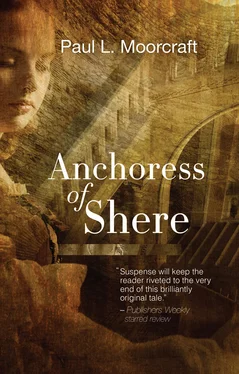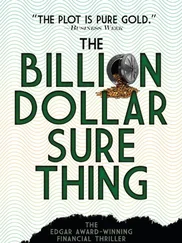Paul Moorcraft - The Anchoress of Shere
Здесь есть возможность читать онлайн «Paul Moorcraft - The Anchoress of Shere» весь текст электронной книги совершенно бесплатно (целиком полную версию без сокращений). В некоторых случаях можно слушать аудио, скачать через торрент в формате fb2 и присутствует краткое содержание. Жанр: Триллер, на английском языке. Описание произведения, (предисловие) а так же отзывы посетителей доступны на портале библиотеки ЛибКат.
- Название:The Anchoress of Shere
- Автор:
- Жанр:
- Год:неизвестен
- ISBN:нет данных
- Рейтинг книги:4 / 5. Голосов: 1
-
Избранное:Добавить в избранное
- Отзывы:
-
Ваша оценка:
- 80
- 1
- 2
- 3
- 4
- 5
The Anchoress of Shere: краткое содержание, описание и аннотация
Предлагаем к чтению аннотацию, описание, краткое содержание или предисловие (зависит от того, что написал сам автор книги «The Anchoress of Shere»). Если вы не нашли необходимую информацию о книге — напишите в комментариях, мы постараемся отыскать её.
The Anchoress of Shere — читать онлайн бесплатно полную книгу (весь текст) целиком
Ниже представлен текст книги, разбитый по страницам. Система сохранения места последней прочитанной страницы, позволяет с удобством читать онлайн бесплатно книгу «The Anchoress of Shere», без необходимости каждый раз заново искать на чём Вы остановились. Поставьте закладку, и сможете в любой момент перейти на страницу, на которой закончили чтение.
Интервал:
Закладка:
Christine returned to Ashe Cottage for a final simple meal with her family. All were quiet over the bowls of soup and bread, followed by salted mackerel. All too soon for Helene, her daughter stood to embrace her. Then Christine enfolded herself in the arms of her brother and father. Her nephew, Margaret’s child, was asleep in a rough wooden cot. She would not wake him, but she bent over to kiss his little hand as Helene held back her tears. William escorted his daughter to the church as a full moon bathed the stone in celestial light. They held each other, but did not speak.
William, seemingly frozen in the moonlight, watched through the church door as Christine walked to the altar and prayed before it on her knees. He gazed on his first-born for long minutes, as the wind fluted through the willows that formed an ostentatious honour-guard for the stream’s passage through the church grounds. A movement in the graveyard suddenly caught his eye: a roe deer had wandered from the Hurtwood. It stood motionless, staring at the carpenter. The deer remained stock-still for a few seconds, then bounded away.
William looked back through the church door at Christine’s devotions, and waited until he could bear no more. If only my daughter had the freedom of that deer, he thought.
Christine prayed throughout the vigils of the night. She asked God to grant her the courage to overcome her fears and doubts. She had been tempted once into breaking her vows, and she could not immediately ignore the maternal urges that her baby nephew had aroused, but this craving would pass from a worldly body cast off when the secular life was renounced for the glories of the Holy Ghost. She prayed for forgiveness for leaving her cell, and for all those who had sought the help of bishops and Pope on her humble behalf.
Because she had been again in the tangible world, among the trees and wind and sun and, above all, people, Christine had lost the sense of being surrounded by the unseen; her material senses had been overwhelmed. In her cell, her previous isolation had refined not only her imagination but also her hearing, which had become very acute. In midsummer she had listened to the song of the grasshopper, at first soft, then gradually louder, stopping quite suddenly before the creature restarted its cycle. In the long evenings in her cell she had paused in her prayers to heed all God’s creatures, especially the nightjars. She had often eavesdropped on the “co-ic” call of the male to its mate; afterwards she would wait for the churring sound of the unpaired males. Then, in the first week of September, the nightjars would fly southwards to unknown parts of the earth, and she would cherish those sounds deep within herself until the birds resumed their courtship in the spring.
In her renewed confinement she would hone her senses once more, and learn again how to transform the mystical nuances of enclosed life into the blessed touch of the hand of God, though she knew that it might be many years before she could personalise the external rhythms of nature into an immanent relationship with Him.
Duval stopped typing and went to the bathroom situated next to his ground-floor study. He felt a little weak. When he denied Marda food, he usually fasted himself, and when he punished her, he had to punish himself. There was no need for a cold bath, he told himself. His third bath of the day would be a hot one; he could think and plan in the luxury of hot soapy water.
He needed to prepare his mind because he had an unwelcome appointment and he did not like meeting strangers. Above all, he did not like Americans, particularly ones who kept pestering him with letters, and he wondered whether he was doing the right thing in agreeing to meet this one.
In fact, Professor Irvine M. Gould had written only three letters; formally couched by the standards of Harvard, but irritatingly intimate according to the conservative norms of English address. The third letter had arrived that morning, and it had begun “Dear Michael.” Duval was appalled at the man’s presumption.
Gould was a medievalist who had initiated a somewhat one-sided correspondence with the priest on the subject of fourteenth-century mysticism. Duval had persuaded himself to answer the second letter, tolerating the foreigner’s interest because it was a mutual one: Christine the anchoress. The professor’s letters had been opaque, but had sufficiently piqued Duval’s interest for him to agree-provisionally-to meet this interloper; “if you come to England,” the priest had blithely written. And now the damned man had actually pitched up in Surrey.
Distrustful of such types, Duval needed time to work out what he would say to the pushy American who had somehow bamboozled him into conceding a meeting. He had two hours before the appointment, which was to take place in the Angel Hotel in Guildford.
Despite his agitated state, Duval was hungry and looked forward to eating that night. Strangely, he thought of meat, even though he had been a vegetarian for many years. He had always regarded his aversion to meat as a symbol of his inability to kill. He reproached himself for this regression, as well as his own nervousness, as he paced up and down his study in a bath towel. Surely he, Michael Duval, was a world authority on anchoresses, and certainly the unchallenged expert on Christine. Nevertheless, the tension forced him to set out early.
Duval parked near the recently completed Yvonne Arnaud Theatre, but did not get out of his car immediately; he sat there thinking, waiting to make a precise entry into the hotel. His Morris shone under the lights of the car park as though it were new, but it was a neon illusion: the car had not been properly cleaned for months. Once he had been fastidious in caring for his possessions, not least his body, but his clothing was beginning to look worn. Members of his congregation had commented to each other that their priest was looking a little seedy, certainly pale and thinner, and perhaps even somewhat scruffy. One had observed a certain wildness in those cold, blue, mesmerising eyes. Duval, however, had not noticed any change in himself.
Punctual to the minute when he walked into the hotel foyer, he asked the receptionist for Professor Gould, then spoke to the man himself, using the phone on the cramped reception desk. The American visitor said he would join him in the small lounge, “the one decorated with reproduction hunting prints.” Duval sat alone in the lounge for a few minutes before a gangly, bespectacled figure with a full beard marched down the stairs, strode up to his table and asked, in an unexpected southern drawl, whether this was indeed Father Michael Duval that he was finally meeting.
Shaking hands, the two men sized each other up. The American’s round spectacles and beard gave the impression of an identikit inhabitant of the ivory tower, while the tweedy jacket with leather elbow patches hinted at what later became apparent: the American was a passionate anglophile. For his part, Gould noticed that the priest was ill at ease, so he determined to be as friendly as possible, despite what he sensed as intellectual suspicion or even rivalry. That, at any rate, was the impression he had garnered from their brief correspondence, but maybe Duval would be more relaxed face to face.
The professor suggested dinner in the hotel. As they sat down in the empty restaurant, Gould explained that he was spending most of a sabbatical leave from Georgetown University in his beloved England. He had already visited the country home of Lewis Carroll, who, as the Reverend Charles Dodgson, had preached at the Saxon church in Guildford. The two enthusiasts of church history soon jettisoned all pretence of small talk: within five minutes they were becoming animated by the concepts of the new Guildford cathedral. Gould admired the original designs by Edward Maufe while Duval did not, although their disagreements were politely academic.
Читать дальшеИнтервал:
Закладка:
Похожие книги на «The Anchoress of Shere»
Представляем Вашему вниманию похожие книги на «The Anchoress of Shere» списком для выбора. Мы отобрали схожую по названию и смыслу литературу в надежде предоставить читателям больше вариантов отыскать новые, интересные, ещё непрочитанные произведения.
Обсуждение, отзывы о книге «The Anchoress of Shere» и просто собственные мнения читателей. Оставьте ваши комментарии, напишите, что Вы думаете о произведении, его смысле или главных героях. Укажите что конкретно понравилось, а что нет, и почему Вы так считаете.












